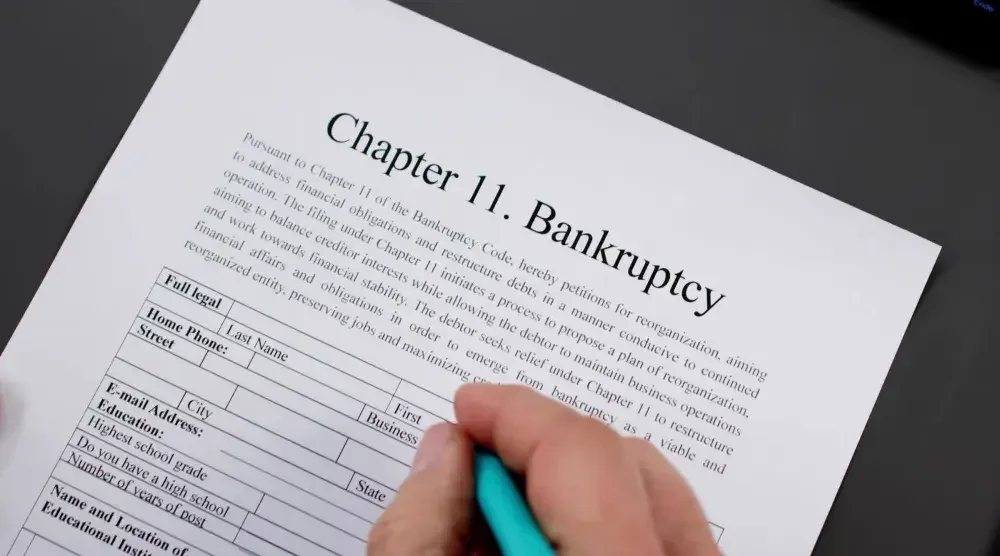If you or your business has reached the point where you are exploring how to file for Chapter 11 bankruptcy, undoubtedly, this is a stressful time in your life. This guide can help you learn more about the process and steps you will want to take to file for Chapter 11 bankruptcy.
Chapter 11 bankruptcy is a legal mechanism for financial reorganization. It is commonly used by large and small businesses, as well as individuals who have substantial debts.

What is Chapter 11 bankruptcy?
Chapter 11 bankruptcy is a form of reorganization typically used by businesses to restructure finances. By filing for Chapter 11 bankruptcy, businesses can continue operating and, in some cases, with the court's permission, even borrow new money.
Nearly all business structures are eligible for Chapter 11 bankruptcy, including corporations and partnerships. If one partner in a partnership structure is declaring bankruptcy, the other partner may need to file for bankruptcy protection to protect their personal assets.
Individuals with significant amounts of debt who may not be eligible for Chapter 7 or Chapter 13 bankruptcy may also be able to file Chapter 11 bankruptcy.
Key terms related to Chapter 11 bankruptcy
The following are terms related to Chapter 11 bankruptcy. An understanding of these terms will help anyone considering the process of filing.
- Adversary proceeding: This is a lawsuit related to a bankruptcy case. A complaint with the court initiates this proceeding.
- Automatic stay: This is a time period where creditors on any debt from before the Chapter 11 filing may not be sought by creditors. All judgments, foreclosures, repossessions of property, and collections activities are suspended.
- Contested matter: These are disputed matters that don't fall within the adversary proceeding definition.
- Debtor in possession: This means the debtor keeps control of its assets while undergoing the reorganization process. No bankruptcy trustee is appointed when there is a debtor in possession.
- Nondischargeable debt: Some debts cannot be eliminated by bankruptcy including mortgages, child support, government-funded educational loans, and restitutions for crimes.
- 341 meeting: Section 341 of the United States Bankruptcy Code requires a meeting of creditors where the debtor is questioned under oath.
- Party in interest: Any party that has standing to be heard by the court in any matter being decided as a part of the bankruptcy proceedings. This includes any bankruptcy trustee, creditors, the debtor themself, and the bankruptcy administrator.
A notable example of a Chapter 11 bankruptcy
In 2009, General Motors (GM) filed for Chapter 11 bankruptcy. This is the fourth-largest bankruptcy case in U.S. history. GM had been in financial trouble for some time before pursuing this reorganization. The filing listed GM as a debtor in possession, and several steps were taken as part of the further financial reorganization, including selling off significant assets such as jets. A government-owned entity purchased GM and rebranded it General Motors LLC. It emerged as a new, smaller entity with fewer brands and employees.
11 steps to file Chapter 11 bankruptcy
Here are the steps you must take to file Chapter 11 bankruptcy.
Step 1: Consult a bankruptcy attorney
Before any decisions are made, the individual or person representing a business considering filing for Chapter 11 bankruptcy should. consult a bankruptcy attorney. The process of filing for Chapter 11 bankruptcy is complex, and an attorney can help you decide whether or not it is the most feasible option for your situation. Additionally, an attorney will help you through the rest of the steps in the filing process.
Step 2: Prepare documentation
The next step, once you and your attorney have determined that filing for Chapter 11 bankruptcy is the most appropriate action for you to take, is to prepare a bankruptcy petition on behalf of yourself as an individual or on behalf of your company. This bankruptcy petition will comprise several official forms and documents, including:
A list of all of your creditors and the specific amount of debt that is owed to each one
- A detailed statement of financial affairs
- Schedules of assets and liabilities
- A schedule of current income and expenditures
- A schedule of executory contracts and unexpired leases
Step 3: File the petition
Your attorney will file the voluntary petition for Chapter 11 bankruptcy with a bankruptcy court in their jurisdiction. This will trigger an automatic stay, temporarily halting all collection activities against you.
Step 4: Pay filing fees
You will be required to pay a filing fee as well as an administrative fee to the bankruptcy courts as part of the filing process. These fees can be substantial and are mandatory to process the bankruptcy case.
Step 5: Operate as a debtor in possession
Once filing has occurred, you will typically operate as a "debtor in possession," which means that you or your company retain control of your assets and business operations. The "debtor in possession" will be under the oversight of the court with your attorney's guidance, and typically speaking, no trustee will be appointed.
Step 6: Creditors' meeting and claims
Next will be a meeting of creditors, also known as the 341 meeting, which is held so your creditors can ask questions about your financial status and plans. Additionally, creditors can file their claims against the bankruptcy estate during this period.
Step 7: File a plan of reorganization
The debtor is required to file a plan of reorganization that outlines how it intends to handle its debts. The plan of reorganization must address how you or your company intends to operate moving forward. This plan must classify claims and interests and propose a means for dealing with them.
Step 8: File the disclosure statement
You and your attorney also need to file a disclosure statement. This statement provides detailed information about your financial affairs and the proposed plan. The court must approve this statement after affirming it contains adequate information.
Step 9: Confirm the plan
Once the court has approved your disclosure statement, your creditors vote on whether or not to accept the proposed reorganization plan. At least two-thirds of the dollar amount or one-half the number of creditors must accept the reorganization plan for it to be accepted. For the plan to be confirmed, it must meet certain statutory requirements, which include feasibility, fairness, and compliance with the Bankruptcy Code. A confirmation hearing will be held by the court to decide whether or not to approve the reorganization plan.
Step 10: Implement the plan
After the plan's court approval, you will begin to follow the terms laid out and pay creditors. The repayment period begins, and you will make monthly payments. During this time, the debtor will remain under court supervision. The court will monitor your compliance with the plan.
Step 11: Discharge and closure
Once the plan is successfully implemented, you will usually receive a discharge of the remaining dischargeable debts. At that time, the case is closed in bankruptcy court.
How much does it cost to file for Chapter 11?
Filing for Chapter 11 bankruptcy in bankruptcy court is not an inexpensive venture. There are significant filing fees, administrative fees, and attorney fees. The more complex your bankruptcy filing, the heftier the expense.
Filing fees
The filing fees for Chapter 11 bankruptcy are fixed: There is a $1,167 filing fee and an additional $571 miscellaneous administration fee. The total of $1738 is due upon filing, although with the court's permission, these fees may be paid over time in installments. Failure to pay these fees can result in the dismissal of the case.
Quarterly fees
There are also quarterly fees to the United States Trustee System Fund involved during the Chapter 11 bankruptcy process. These fees are based on percentages of the total disbursements during a three-month period and are due each quarter from the filing until the case is closed.
According to The Small Business Reorganization Act of 2019, a small business debtor can meet certain eligibility criteria that would exempt them from these fees.
Attorney fees
According to debt.org, the average attorney fees involved in filing for Chapter 11 bankruptcy are $18,000 for a cut-and-dried case. A more difficult case may cost upwards of $50,000, while a very complex case could result in $100,000 in attorney fees.
Chapter 11 bankruptcies can take several years since this is a reorganization process rather than asset liquidation. Attorneys mostly charge hourly fees, as opposed to flat rates, for these cases because they are time-consuming and go on for an extended period. These steep costs are also why the Chapter 11 bankruptcy process is not usually an option for individuals or couples.
Additional cost considerations
There are other long-term costs of filing for Chapter 11 bankruptcy. When you have filed for bankruptcy, your credit score will take a significant hit, putting you in a higher risk category for debt. This means that it may be more difficult to secure loans, and even if you do, the interest rate will be higher, costing you more money over time. Other expenses may also be increased, including insurance, because you are now seen as a greater financial risk. Bankruptcy remains on your credit report for seven to 10 years, and the best way to lessen the damage of this is to reestablish your good credit by always paying bills on time.
Chapter 11 advantages and considerations
There are several advantages to filing for Chapter 11 bankruptcy. Additionally, there are significant challenges to be considered.
Advantages
Filing for Chapter 11 bankruptcy offers several advantages for individuals as well as businesses.
- The ability to continue your business. Perhaps the largest advantage to filing for Chapter 11 bankruptcy is that, in most cases, you can continue business operations, providing an opportunity to continue earning money that will be useful in repayment efforts.
- Breathing room. After filing, the automatic stay means that creditors may not contact you for a period, which offers business owners relief from that stress.
- Opportunity for loans. Debtor-in-possession financing is advantageous for lenders, so businesses are in a good position to receive a much-needed cash injection during this time, so long as the court approves this.
- Potential for debt renegotiation. When filing for Chapter 11 bankruptcy, businesses can renegotiate their debts, which offers some financial relief. Unsecured creditors stand to receive zero repayments should a company go out of business, so they are often flexible and receptive to receiving a smaller amount or payment over time in an installment agreement that the parties negotiate.
Challenges
There are some challenges associated with filing for Chapter 11 bankruptcy that must be acknowledged and considered.
- Significant costs. Between filing and attorney fees, a struggling company may be unable to afford Chapter 11 filing.
- Time-consuming process. The process of a Chapter 11 bankruptcy can take years from start to finish. This will impact operations in a significant way.
- The court has control. To comply with Chapter 11 requirements, the trustee program must approve your reorganization plan. They will decide whether or not your plan to repay creditors is sufficient.
FAQs
Frequently asked questions about filing for Chapter 11 bankruptcy.
How does Chapter 11 bankruptcy work?
When a company or an individual decides to file for Chapter 11 bankruptcy, they must first consult an attorney. The attorney will guide them through the process of compiling documentation, filing with the court, creating plans, meeting with creditors who will need to approve their plans, and executing those plans in compliance with the Bankruptcy Code. For businesses in financial distress, Chapter 11 bankruptcy is a reorganization plan.
How long does a Chapter 11 bankruptcy take?
While some cases may be wrapped up within months, Chapter 11 bankruptcies can take as many as five years or more. There will be deadlines throughout the process, and some of those deadlines can be extended upon request. It is not a quick process.
How is a Chapter 11 reorganization plan confirmed?
A Chapter 11 reorganization plan is confirmed by meeting certain legal requirements found in the Bankruptcy Code before the court after your creditors have accepted your plan. The court also makes sure that creditors do not discriminate unfairly against you. This takes place at a confirmation hearing held by the court.
Can a Chapter 11 bankruptcy be converted to another chapter?
Yes, a debtor has the right to convert a Chapter 11 case to a Chapter 7 case so long as it wasn't previously converted to a Chapter 11 case. Additionally, other parties, such as a trustee, may request conversion of the Chapter 11 bankruptcy.
What's the difference between Chapter 7, 11, and 13 bankruptcy?
Here are the basic distinctions between the three bankruptcy chapters:
- Chapter 7 is the most common form of bankruptcy filing. Liquidation of assets may occur, but the majority of these cases involve debtors with no assets. Unsecured creditors are entitled to only a portion of what they are owed. Unsecured debt is typically removed by Chapter 7 bankruptcy. In fact, most remaining debts are wiped clean, with the exceptions of child support payments, student loans, and some others. Courts may enforce existing liens.
- Chapter 11 is primarily for businesses due to the high cost and commitment. Some individuals, such as professional athletes or celebrities, may have debts exceeding the debt limits of Chapters 7 and 13 and could pursue this as an option.
- Chapter 13 is a reorganization bankruptcy plan for individuals who want to keep their assets but are behind on repayments of debts due to difficulties in personal finance and financial obligations. A Chapter 13 plan must pass the "best interest of creditors" test. After a repayment plan period of between 3 to 5 years, any remaining unsecured debts are typically discharged. Credit counseling and ongoing meetings with a credit counselor are required for anyone filing for Chapter 13 bankruptcy.
Filing for Chapter 11 bankruptcy is a time-consuming and expensive process, but with the help of a trusted attorney, you will be able to reorganize your company while continuing to operate.


